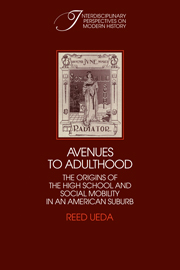Book contents
- Frontmatter
- Contents
- Acknowledgments
- Introduction
- 1 Farm village to commuter suburb
- 2 The evolution of educational leadership
- 3 The free high school
- 4 The rise of Yankee city and the prolongation of schooling
- 5 Popularizing high school: “the college of the people”
- 6 The origins of high school youth culture
- 7 Educational opportunity and social mobility
- 8 The birth of progressive reform and the junior high school
- Conclusion: The high school in the light of history
- Appendix I Courses of study
- Appendix II Sources and methods
- Appendix III Students and households
- Appendix IV Supplementary household data
- Notes
- Index
- Frontmatter
- Contents
- Acknowledgments
- Introduction
- 1 Farm village to commuter suburb
- 2 The evolution of educational leadership
- 3 The free high school
- 4 The rise of Yankee city and the prolongation of schooling
- 5 Popularizing high school: “the college of the people”
- 6 The origins of high school youth culture
- 7 Educational opportunity and social mobility
- 8 The birth of progressive reform and the junior high school
- Conclusion: The high school in the light of history
- Appendix I Courses of study
- Appendix II Sources and methods
- Appendix III Students and households
- Appendix IV Supplementary household data
- Notes
- Index
Summary
In Paris, at the great World's Exposition of 1900, thousands of observers from all nations marveled in fascination at the educational achievements of democracy heralded in the American Educational Exhibit. They drew around the special showcase for the high schools of Somerville, Massachusetts, a Boston suburb. Exhibited there were “interior and exterior views” of the Latin High School, a display of the English High School “in all its cosmopolitan branches from art to science, from studio to laboratory,” and a copy of a school yearbook. The American high school represented by Somerville became a symbol of the civilizing and technological progress of modern times celebrated by the world's fair. How the American high school developed a consequential role in social change, widely recognized in late industrial society, is the subject of this community study of Somerville.
Historians and sociologists possess only a preliminary understanding of the public high school's role in the forming of the industrial social order. This study, therefore, seeks to throw light on the function of the modern American high school in the currents of migration and social mobility generated by the industrial revolution. The high school served as a pathway for various social groups to white-collar and professional jobs. If so, did it serve to promote the formation of a middle class and to define its characteristics? Moreover, did it recruit the children of immigrants and manual workers into these forms of employment? This study reconstitutes the life courses of three generations of high school students to determine if John Goldthorpe's finding that education promoted the social mobility of British workers has an American parallel, or whether, as Samuel Bowles and Herbert Gintis argued, schooling reinforced the social inequalities of capitalist society.
- Type
- Chapter
- Information
- Avenues to AdulthoodThe Origins of the High School and Social Mobility in an American Suburb, pp. 1 - 3Publisher: Cambridge University PressPrint publication year: 1987
- 2
- Cited by



